#include <asm/sgx.h>#include "cpuid.h"#include "kvm_cache_regs.h"#include "nested.h"#include "sgx.h"#include "vmx.h"#include "x86.h"
Include dependency graph for sgx.c:
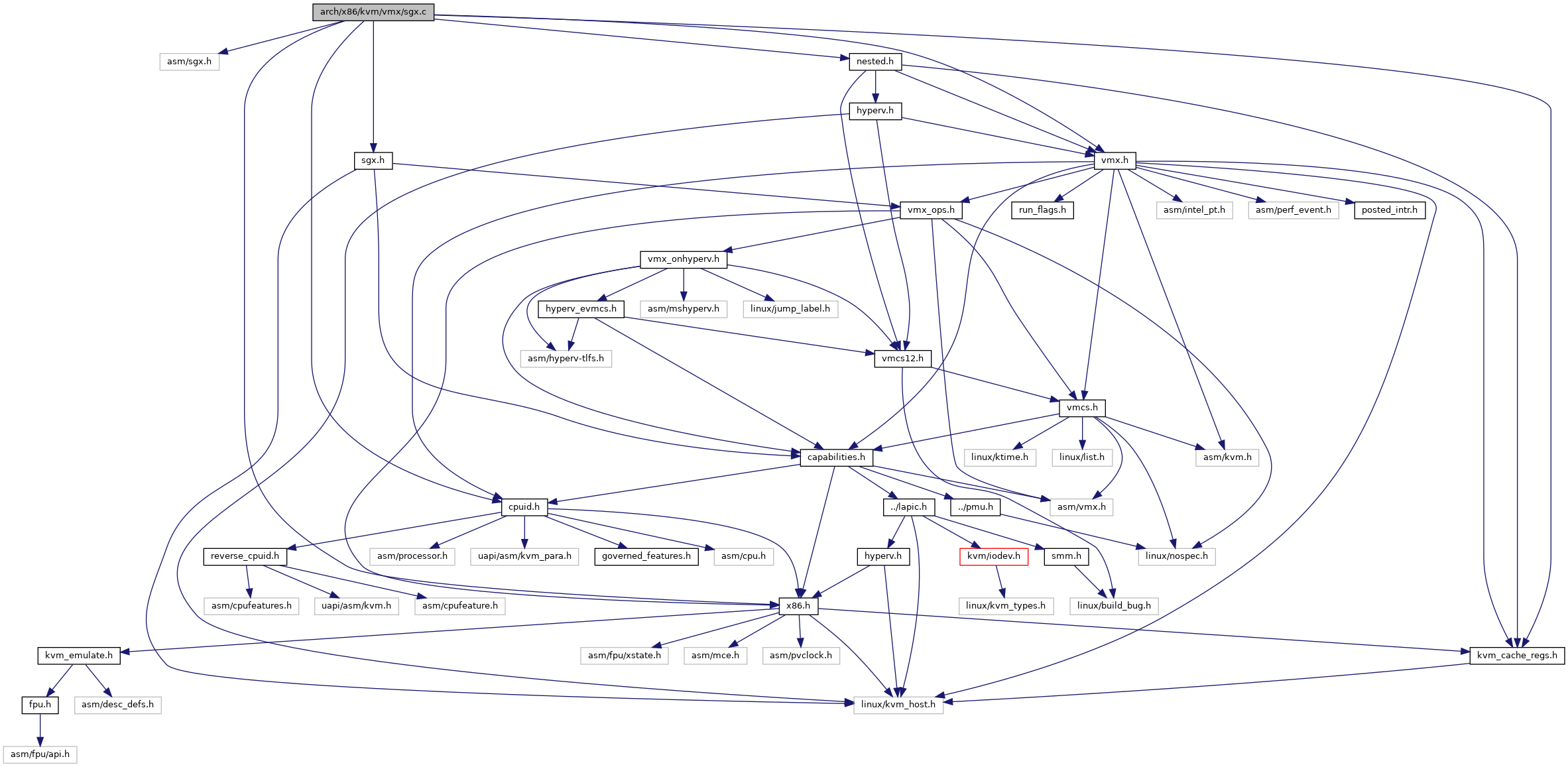
Go to the source code of this file.
Macros | |
| #define | pr_fmt(fmt) KBUILD_MODNAME ": " fmt |
Functions | |
| module_param_named (sgx, enable_sgx, bool, 0444) | |
| static int | sgx_get_encls_gva (struct kvm_vcpu *vcpu, unsigned long offset, int size, int alignment, gva_t *gva) |
| static void | sgx_handle_emulation_failure (struct kvm_vcpu *vcpu, u64 addr, unsigned int size) |
| static int | sgx_read_hva (struct kvm_vcpu *vcpu, unsigned long hva, void *data, unsigned int size) |
| static int | sgx_gva_to_gpa (struct kvm_vcpu *vcpu, gva_t gva, bool write, gpa_t *gpa) |
| static int | sgx_gpa_to_hva (struct kvm_vcpu *vcpu, gpa_t gpa, unsigned long *hva) |
| static int | sgx_inject_fault (struct kvm_vcpu *vcpu, gva_t gva, int trapnr) |
| static int | __handle_encls_ecreate (struct kvm_vcpu *vcpu, struct sgx_pageinfo *pageinfo, unsigned long secs_hva, gva_t secs_gva) |
| static int | handle_encls_ecreate (struct kvm_vcpu *vcpu) |
| static int | handle_encls_einit (struct kvm_vcpu *vcpu) |
| static bool | encls_leaf_enabled_in_guest (struct kvm_vcpu *vcpu, u32 leaf) |
| static bool | sgx_enabled_in_guest_bios (struct kvm_vcpu *vcpu) |
| int | handle_encls (struct kvm_vcpu *vcpu) |
| void | setup_default_sgx_lepubkeyhash (void) |
| void | vcpu_setup_sgx_lepubkeyhash (struct kvm_vcpu *vcpu) |
| static bool | sgx_intercept_encls_ecreate (struct kvm_vcpu *vcpu) |
| void | vmx_write_encls_bitmap (struct kvm_vcpu *vcpu, struct vmcs12 *vmcs12) |
Variables | |
| bool __read_mostly | enable_sgx = 1 |
| static u64 sgx_pubkey_hash[4] | __ro_after_init |
Macro Definition Documentation
◆ pr_fmt
Function Documentation
◆ __handle_encls_ecreate()
|
static |
Definition at line 141 of file sgx.c.
struct kvm_cpuid_entry2 * kvm_find_cpuid_entry_index(struct kvm_vcpu *vcpu, u32 function, u32 index)
Definition: cpuid.c:1447
static int sgx_inject_fault(struct kvm_vcpu *vcpu, gva_t gva, int trapnr)
Definition: sgx.c:105
int kvm_skip_emulated_instruction(struct kvm_vcpu *vcpu)
Definition: x86.c:8916
void kvm_prepare_emulation_failure_exit(struct kvm_vcpu *vcpu)
Definition: x86.c:8727
Here is the call graph for this function:
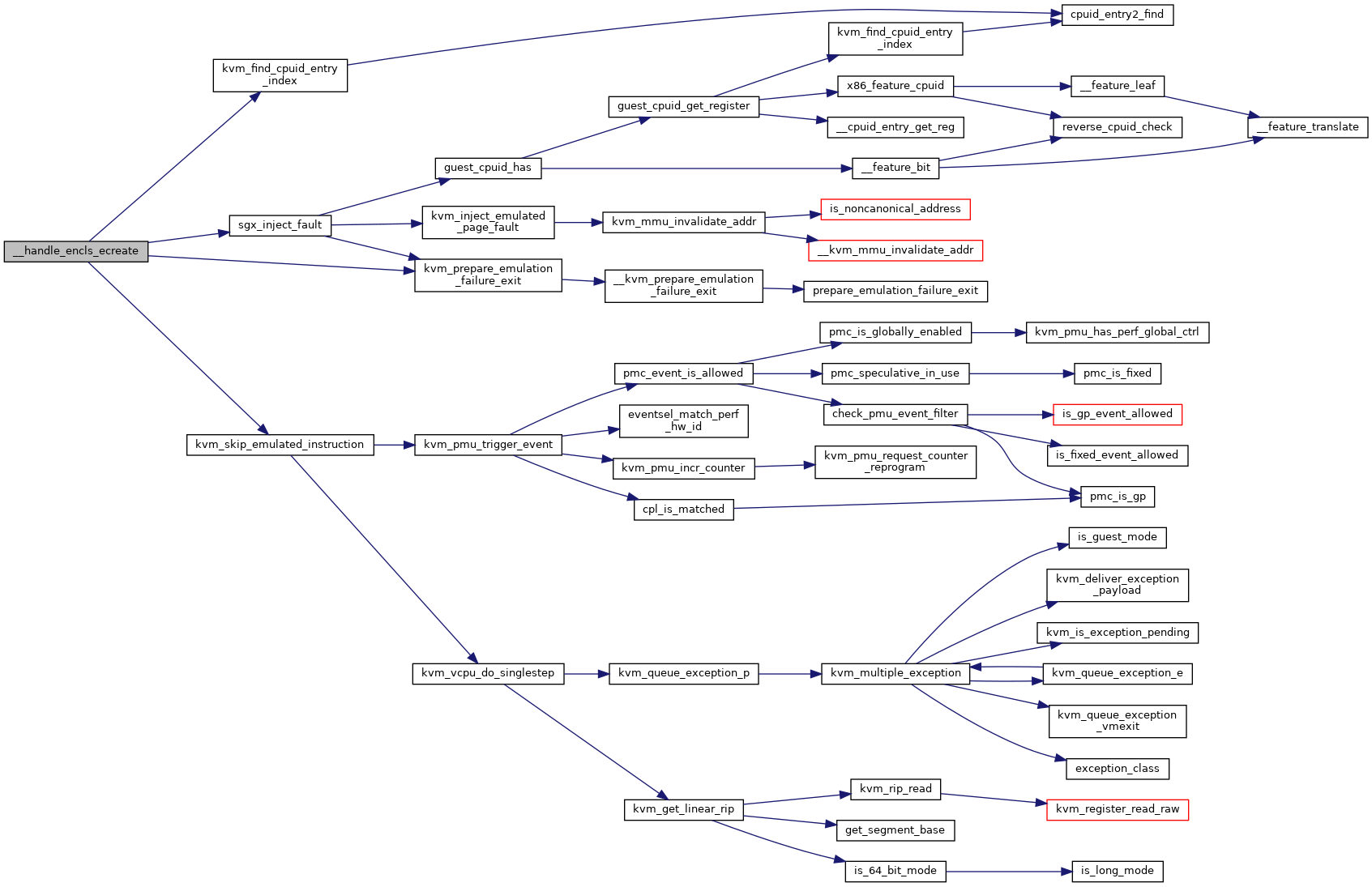
Here is the caller graph for this function:

◆ encls_leaf_enabled_in_guest()
|
inlinestatic |
Definition at line 359 of file sgx.c.
static __always_inline bool guest_cpuid_has(struct kvm_vcpu *vcpu, unsigned int x86_feature)
Definition: cpuid.h:83
Here is the call graph for this function:

Here is the caller graph for this function:

◆ handle_encls()
| int handle_encls | ( | struct kvm_vcpu * | vcpu | ) |
Definition at line 381 of file sgx.c.
static bool sgx_enabled_in_guest_bios(struct kvm_vcpu *vcpu)
Definition: sgx.c:374
static bool encls_leaf_enabled_in_guest(struct kvm_vcpu *vcpu, u32 leaf)
Definition: sgx.c:359
void kvm_queue_exception(struct kvm_vcpu *vcpu, unsigned nr)
Definition: x86.c:731
Here is the call graph for this function:
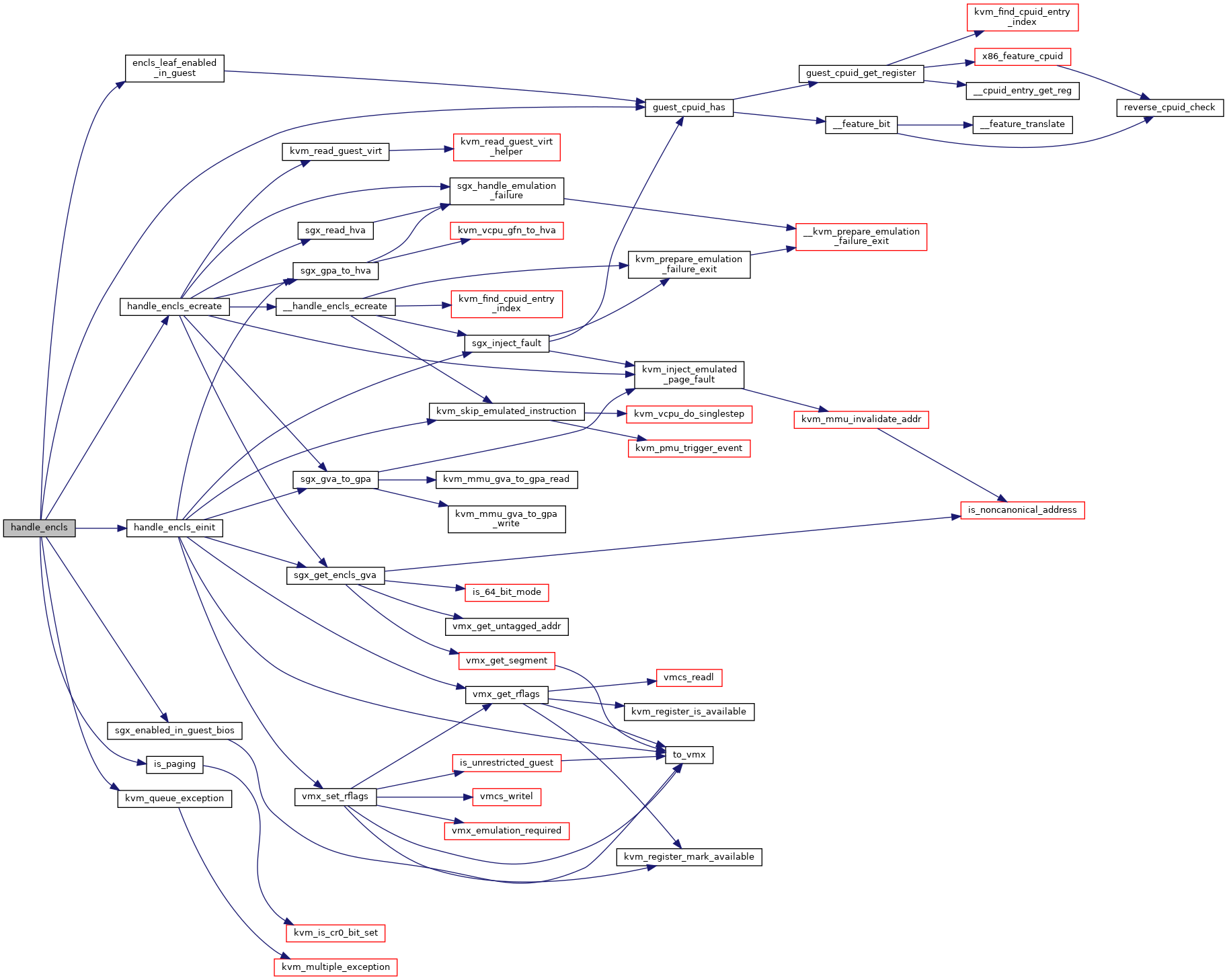
◆ handle_encls_ecreate()
|
static |
Definition at line 217 of file sgx.c.
static int sgx_gpa_to_hva(struct kvm_vcpu *vcpu, gpa_t gpa, unsigned long *hva)
Definition: sgx.c:92
static int __handle_encls_ecreate(struct kvm_vcpu *vcpu, struct sgx_pageinfo *pageinfo, unsigned long secs_hva, gva_t secs_gva)
Definition: sgx.c:141
static int sgx_get_encls_gva(struct kvm_vcpu *vcpu, unsigned long offset, int size, int alignment, gva_t *gva)
Definition: sgx.c:24
static int sgx_gva_to_gpa(struct kvm_vcpu *vcpu, gva_t gva, bool write, gpa_t *gpa)
Definition: sgx.c:74
static int sgx_read_hva(struct kvm_vcpu *vcpu, unsigned long hva, void *data, unsigned int size)
Definition: sgx.c:63
static void sgx_handle_emulation_failure(struct kvm_vcpu *vcpu, u64 addr, unsigned int size)
Definition: sgx.c:55
Definition: kvm_emulate.h:22
int kvm_read_guest_virt(struct kvm_vcpu *vcpu, gva_t addr, void *val, unsigned int bytes, struct x86_exception *exception)
Definition: x86.c:7572
void kvm_inject_emulated_page_fault(struct kvm_vcpu *vcpu, struct x86_exception *fault)
Definition: x86.c:796
Here is the call graph for this function:
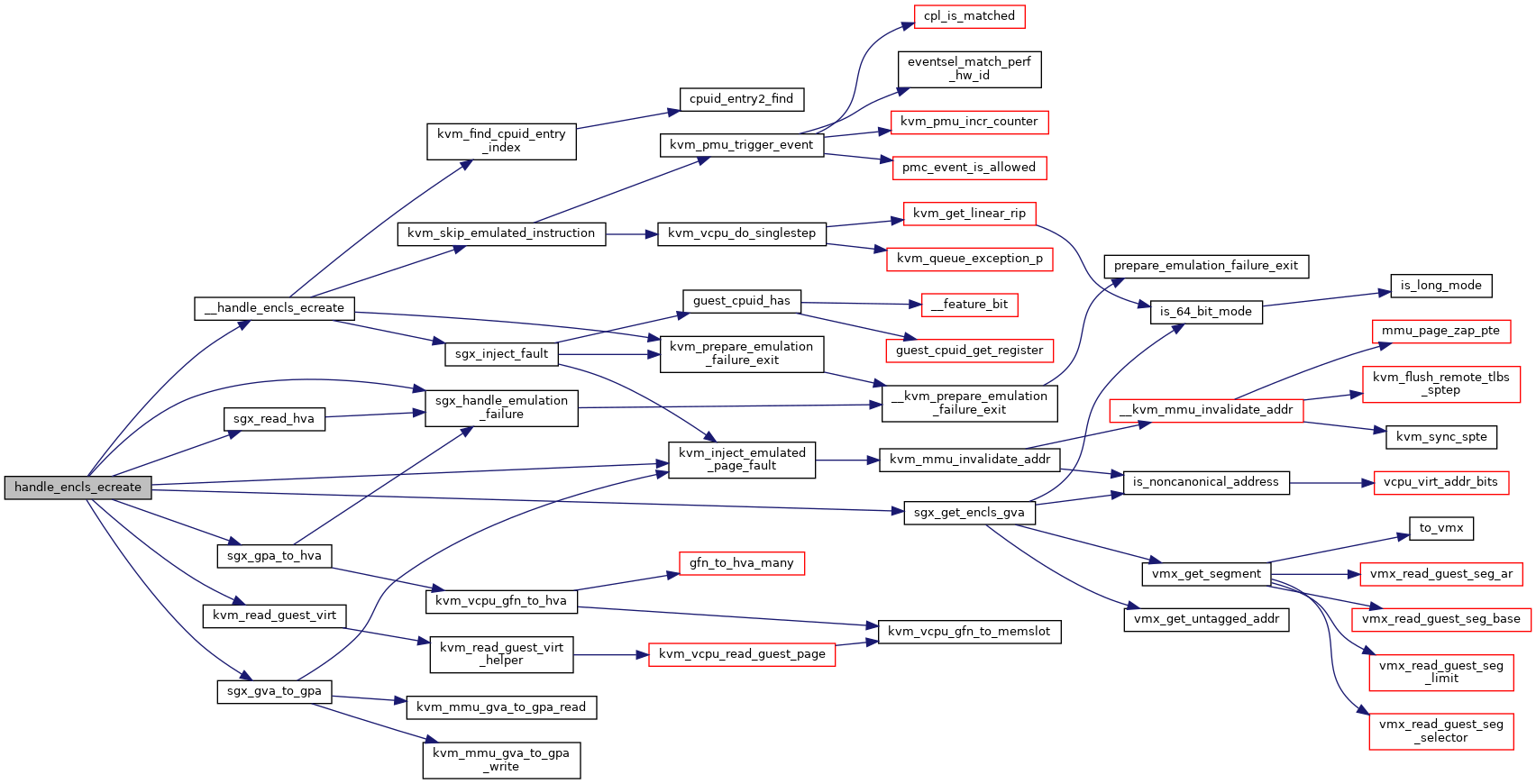
Here is the caller graph for this function:

◆ handle_encls_einit()
|
static |
Definition at line 297 of file sgx.c.
void vmx_set_rflags(struct kvm_vcpu *vcpu, unsigned long rflags)
Definition: vmx.c:1527
Here is the call graph for this function:
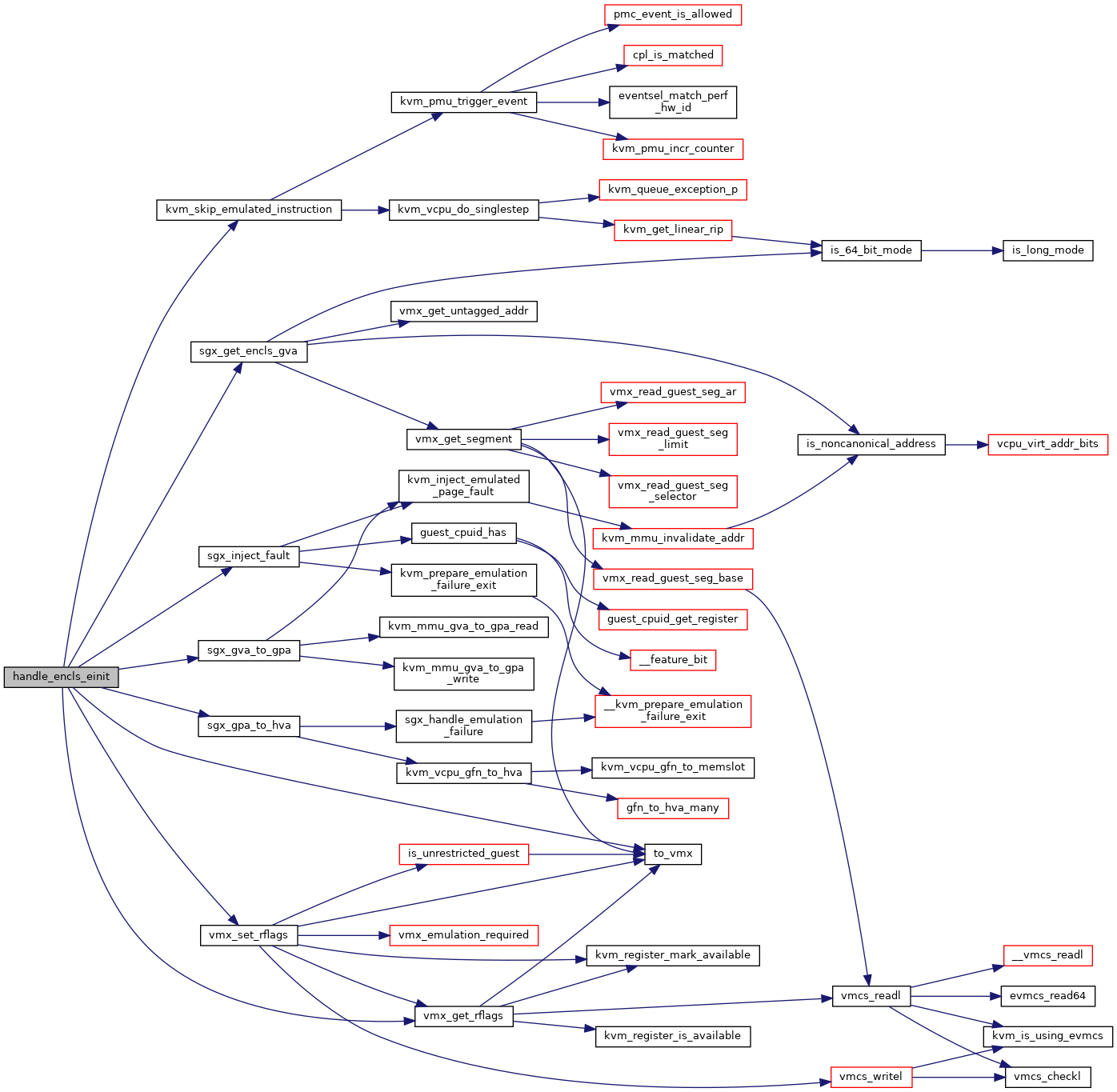
Here is the caller graph for this function:

◆ module_param_named()
| module_param_named | ( | sgx | , |
| enable_sgx | , | ||
| bool | , | ||
| 0444 | |||
| ) |
◆ setup_default_sgx_lepubkeyhash()
| void setup_default_sgx_lepubkeyhash | ( | void | ) |
◆ sgx_enabled_in_guest_bios()
|
inlinestatic |
◆ sgx_get_encls_gva()
|
static |
Definition at line 24 of file sgx.c.
gva_t vmx_get_untagged_addr(struct kvm_vcpu *vcpu, gva_t gva, unsigned int flags)
Definition: vmx.c:8250
void vmx_get_segment(struct kvm_vcpu *vcpu, struct kvm_segment *var, int seg)
Definition: vmx.c:3496
static bool is_noncanonical_address(u64 la, struct kvm_vcpu *vcpu)
Definition: x86.h:213
Here is the call graph for this function:
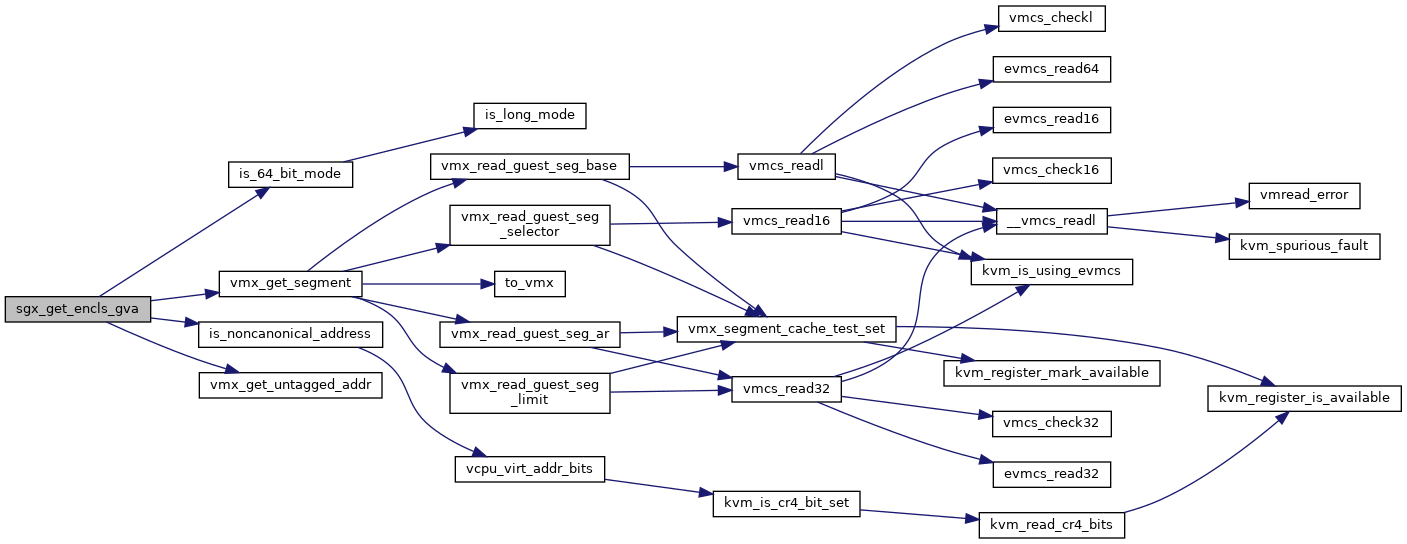
Here is the caller graph for this function:

◆ sgx_gpa_to_hva()
|
static |
Definition at line 92 of file sgx.c.
unsigned long kvm_vcpu_gfn_to_hva(struct kvm_vcpu *vcpu, gfn_t gfn)
Definition: kvm_main.c:2748
Here is the call graph for this function:

Here is the caller graph for this function:

◆ sgx_gva_to_gpa()
|
static |
Definition at line 74 of file sgx.c.
gpa_t kvm_mmu_gva_to_gpa_read(struct kvm_vcpu *vcpu, gva_t gva, struct x86_exception *exception)
Definition: x86.c:7483
gpa_t kvm_mmu_gva_to_gpa_write(struct kvm_vcpu *vcpu, gva_t gva, struct x86_exception *exception)
Definition: x86.c:7493
Here is the call graph for this function:
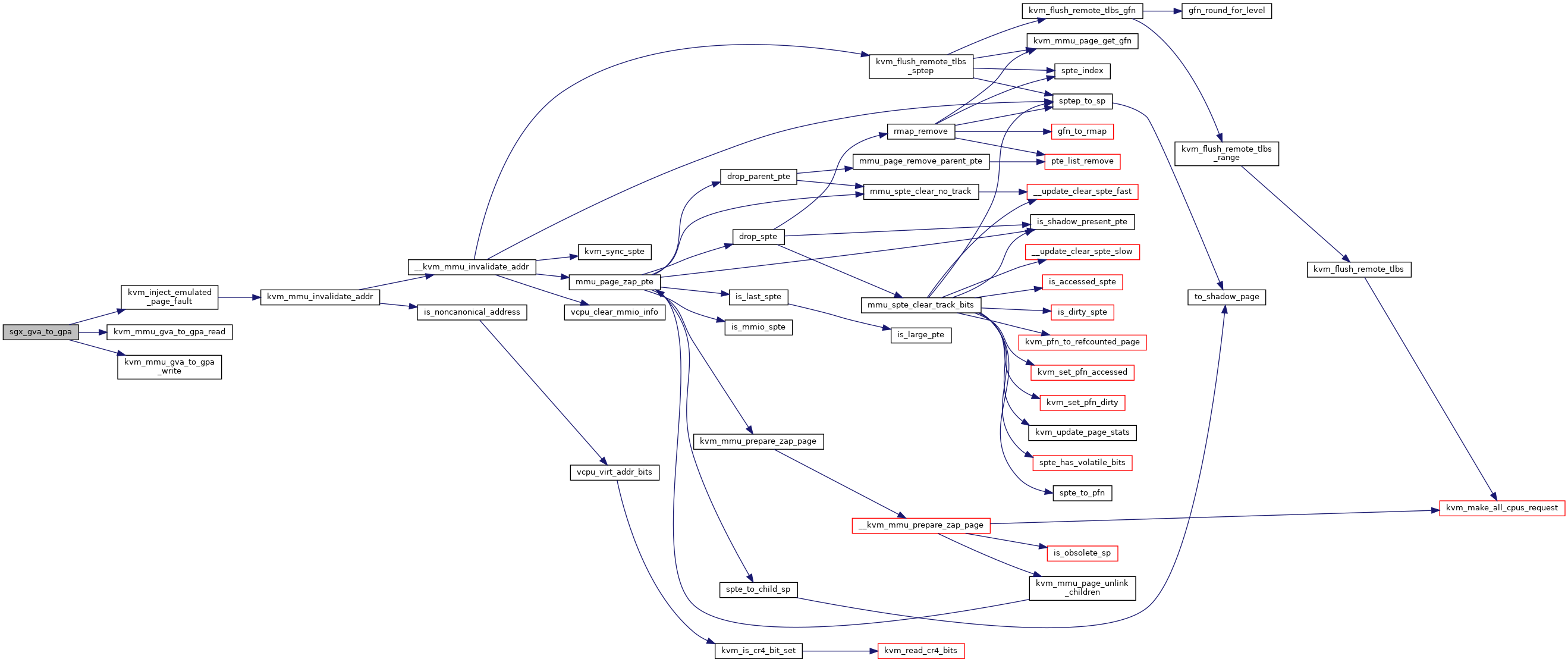
Here is the caller graph for this function:

◆ sgx_handle_emulation_failure()
|
static |
Definition at line 55 of file sgx.c.
void __kvm_prepare_emulation_failure_exit(struct kvm_vcpu *vcpu, u64 *data, u8 ndata)
Definition: x86.c:8720
Here is the call graph for this function:

Here is the caller graph for this function:

◆ sgx_inject_fault()
|
static |
◆ sgx_intercept_encls_ecreate()
|
static |
◆ sgx_read_hva()
|
static |
◆ vcpu_setup_sgx_lepubkeyhash()
| void vcpu_setup_sgx_lepubkeyhash | ( | struct kvm_vcpu * | vcpu | ) |
◆ vmx_write_encls_bitmap()
| void vmx_write_encls_bitmap | ( | struct kvm_vcpu * | vcpu, |
| struct vmcs12 * | vmcs12 | ||
| ) |
Definition at line 468 of file sgx.c.
static bool nested_cpu_has_encls_exit(struct vmcs12 *vmcs12)
Definition: nested.h:243
static bool sgx_intercept_encls_ecreate(struct kvm_vcpu *vcpu)
Definition: sgx.c:440
Definition: vmcs12.h:27
static __always_inline void vmcs_write64(unsigned long field, u64 value)
Definition: vmx_ops.h:246
Here is the call graph for this function:
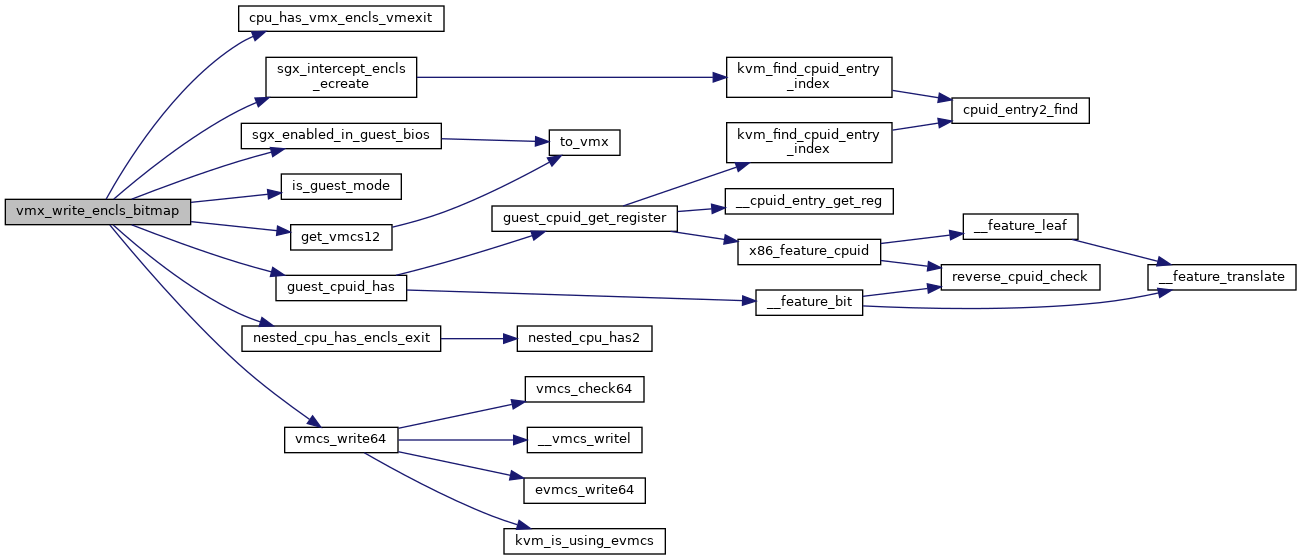
Here is the caller graph for this function:

Variable Documentation
◆ __ro_after_init
◆ enable_sgx
| bool __read_mostly enable_sgx = 1 |










